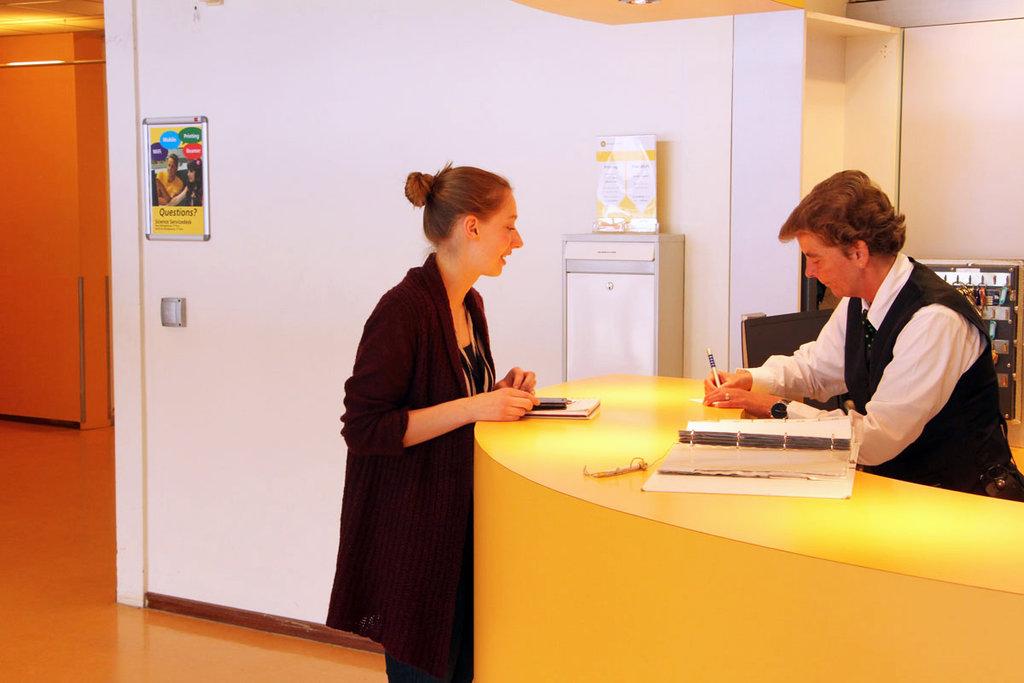UU closes reception desk at Buys Ballot building; will have mobile surveillance instead

An elderly man, coming to speak at the Maths convention; a student who wants to put up a poster. A steady stream of visitors reports at receptionist Sandra van Weverwijk’s desk in the Buys Ballot building on a random Wednesday afternoon.
Van Weverwijk has worked in the building for 23 years – but her job will cease to exist July 1st. The Faculty of Science recently agreed to the FSC’s proposal to close the reception desk.
Starting this summer, everyone working at the Uithof’s Buys Ballot building will need an access card to open the doors. Guests can be signed in at a central desk in the Koningsberger building, from where the doors can be opened, or they can use the entrances to either the Koningsberger building or the Minnaert building.
“Very disappointing,” Van Weverwijk says, after explaining to the elderly man’s companion that they’ll get a wheel clamp on their car if they leave it parked at the Princeton square. “I started here when I was still wet behind the ears.”
Van Weverwijk says she doesn’t know yet in which UU building she’ll be working after the summer. She’s already spoken to many students and employees about her upcoming departure. “Everyone says they don’t really understand why it’s happening.”
Mobile surveillance
After the Buys Ballot building, two other receptions may be closing too, says Eddie Verzendaal. He is the director of the Facility Services Center, which is responsible for the security in all UU buildings. He will be discussing the plans with the people who use those buildings soon.
Verzendaal says he’s following the advice of security experts and will have guards walking around instead; a system of mobile surveillance. He also wants to train other FSC employees, such as technicians and cleaners, to spot and report suspicious behavior. This ‘pro-active’ system is supposed to result in a higher level of security than having a receptionist stationed at the front door. “You could say we just have a false sense of security, the way it is now.”
According to Verzendaal, the university has to deal with risks and threats that didn’t exist before. “Nothing has happened yet, and there are no indications that anything will happen, but according to the security experts, the easily accessible university buildings are so-called ‘soft targets’ for extremists. That means that as an organization, you need to be more aware of what goes on in your buildings.”
In most buildings, not much will change, Verzendaal expects. It’s necessary to have a receptionist stationed in buildings frequented by many students and visitors. For three buildings where this is not the case, FSC wants to create one central desk, and become accessible only to those with permission.
The familiar face
In the comments under an intranet article about the closure of the Buys Ballot building reception, two employees voice their dissatisfaction about the decision. It’s seen as a “customer unfriendly” and “inhospitable” to have the familiar face at the reception desk disappear.
Mark Uwland, secretary at the Freudenthal Institute, says students, employees and visitors will be the victims of this decision. He writes: “I get the feeling that the arguments are focused on safety only, whereas I think the most important aspect of the reception desk is the hospitality. If we say the university has a social responsibility, is open to the outside world – for instance by providing education – then we need to at least receive the people from the outside world in a polite manner, and not let them face closed doors and let them walk alone through cold hallways. The research institutes in the Buys Ballot Building are acutely aware of this social responsibility, and receive many visitors. We would like to keep having them welcomed by a friendly receptionist.”
In a commission for the U-Raad on Tuesday, one worried council member asked questions about the consequences for researchers and students.
Director Verzendaal says he’s sympathetic to the worries of employees who will miss the ‘familiar face’ at the building’s entrance, or those who don’t understand how the closure of the desks fits in with the university’s ideas about ‘community’. “I trust that, with all our staff present in the buildings, we’ll be able to show that the sense of community does not depend solely on one person.”
Verzendaal also points out the many budget cuts this decision facilitates. “We’re not doing this to save money, but a reception desk costs about 100.000 euros a year. Of course we’ll have to replace parts of these functions, but in the end, we’ll be saving about 60.000 to 70.000 euros. That money can then be used by the faculties in education and research.”
Traffic
Machiel van der Grift, responsible for the Faculty of Science’s housing policy, says the amount of money saved is one of the reasons his board agreed with the FSC plans. “We’ve been pressing the FSC for cost reduction for a long time; we have to be open to their suggestions.”
Van der Grift also points out that the Buys Ballot building’s main entrance is becoming less and less popular. “There’s a downturn in traffic there. Our employees aren’t allowed to park at the Princeton square parking lot right in front anymore – that’s for use by TNO and Deltares only. Students park their bikes in the large, new cellar beneath the Koningsberger building, and continue the way to the Buys Ballot building from there.”
Questions and comments from users of the Buys Ballot building have started to reach Van der Grift, ranging from disappointment to practical questions about the consequences. “We understand that people aren’t happy about having a familiar face leave, but we’re confident that we’ll be able to maintain – and hopefully improve – both safety and service levels. We’re having a Q&A session on May 10th, and we’ll hopefully be able to answer everyone’s questions then.”